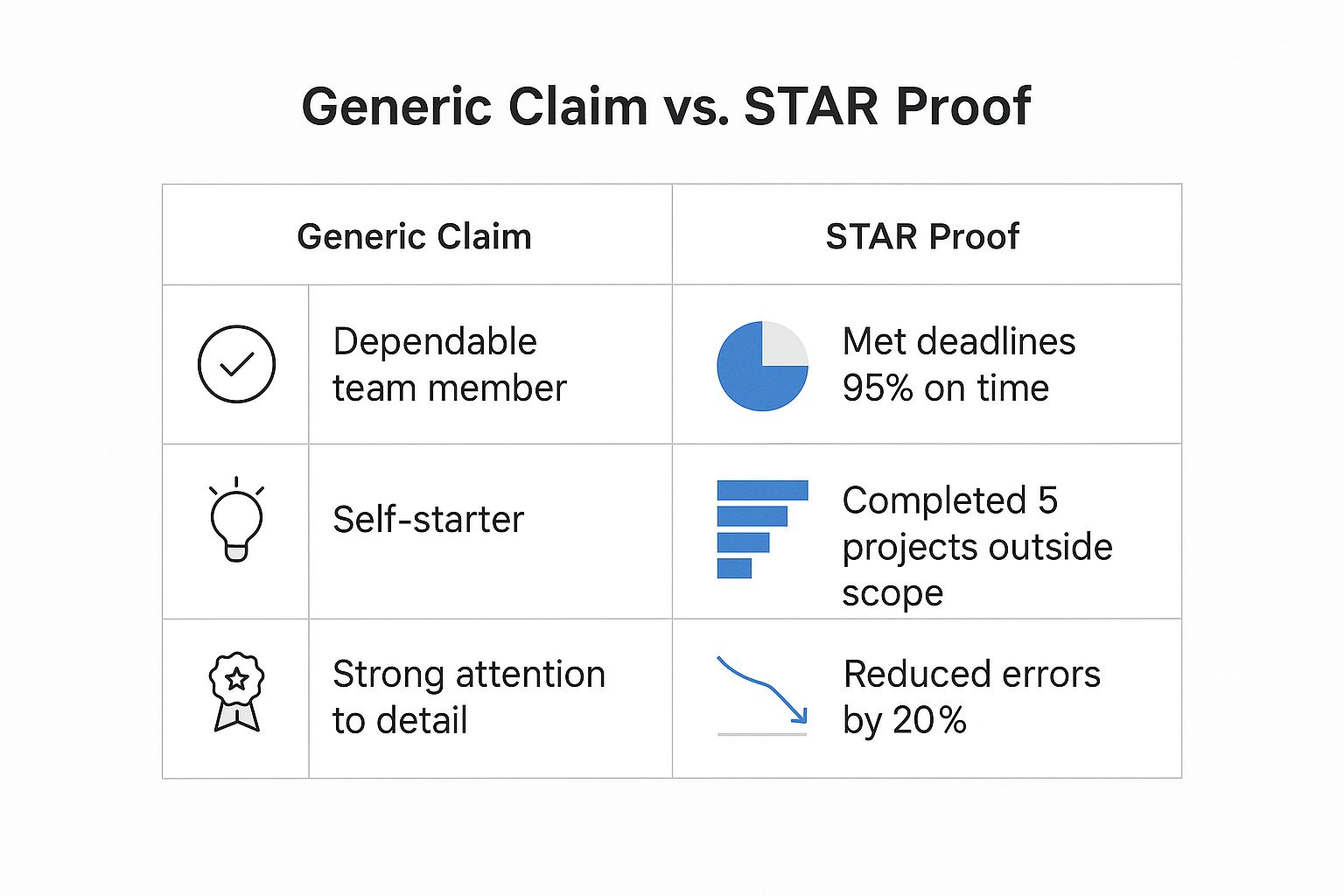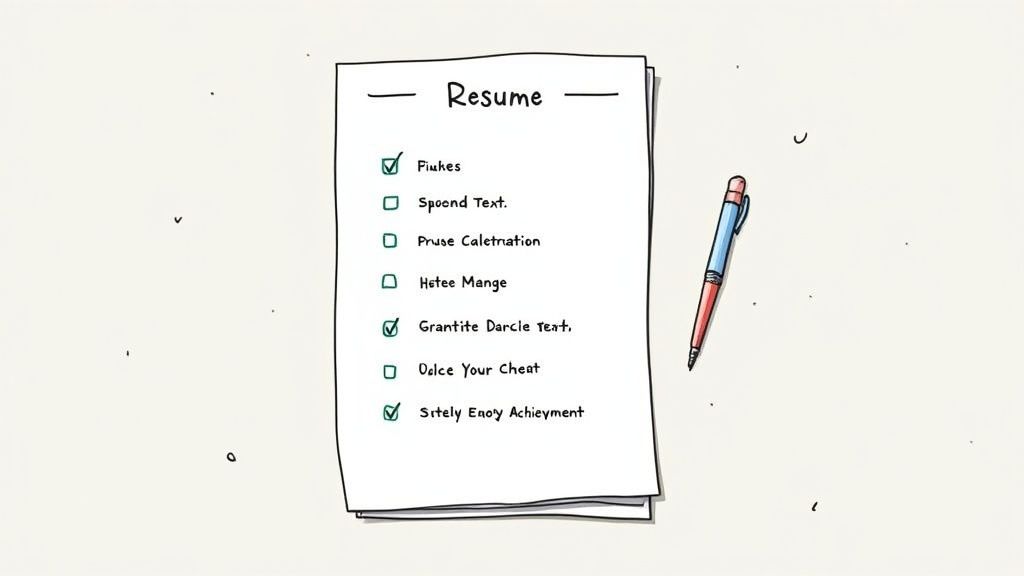How to Describe Your Work Ethic and Stand Out
- Alex Khamis
- Oct 11, 2025
- 9 min read
To really nail the "work ethic" question, you have to live by one simple rule: Show, don't tell. Anyone can toss out empty phrases like "hard worker." What really gets a hiring manager's attention are the stories that prove it.
Why "I'm a Hard Worker" Is a Complete Waste of Breath
Let's be blunt. Telling a hiring manager you’re a “hard worker” or “dedicated” does absolutely nothing for you. It's just noise.
Recruiters hear these exact phrases dozens of time a day. They’ve become so overused that they’re completely meaningless. It's like saying, "I'm a nice person." It might be true, but it carries zero weight because anyone can say it.

What They’re Really Asking
When an interviewer asks about your work ethic, they aren't looking for a simple adjective. They're testing you. They want to see if you can connect your personal values to professional results. Can you back up your claims with evidence?
Deep down, they're asking questions like:
Can I count on you when a deadline is tight?
Do you take ownership or just punch the clock?
How do you react when a project goes off the rails?
Answering with "I have a strong work ethic" fails this test completely. It tells them you haven't thought about how to translate your skills into business value. For a deeper dive, check this guide on how to list soft skills on a resume to actually stand out.
The Power of Proof Over Platitudes
The solution is simple: Stop making claims and start presenting evidence.
Instead of telling them you're reliable, show them. Talk about the time you stayed late to help a teammate finish a critical report. That one story says more than any adjective ever could.
Your work ethic isn't a label. It's the sum of your actions, decisions, and the results you produce when no one is watching.
This shift in mindset is crucial. You need to think like a lawyer building a case. Gather your evidence—your stories of initiative, perseverance, and quality—and present it clearly. This is how you become memorable.
Use the STAR Method to Pinpoint Your Work Ethic
Before you talk about your work ethic, you have to know what it actually looks like. Anyone can say they're "dedicated," but those are just words. Real work ethic shows up in your actions. The STAR method helps you dig up the proof.
Recruiters love this framework. It cuts through vague claims and gets right to how you actually behave. When you build a library of your own STAR stories, you're creating a portfolio of evidence you can pull from for any situation.
The Four Parts of a STAR Story
This method breaks down any experience into four distinct parts. This structure forces you to focus on results, not just your intentions.
Situation: Briefly set the scene. What was the challenge?
Task: What was your specific goal or responsibility?
Action: What concrete steps did you take to handle it?
Result: What was the outcome? Use numbers here.
Think of it as reverse-engineering your biggest wins. This turns a fuzzy memory into a powerful story. If you want to dive deeper, our article on framing your resume accomplishments is a great place to start.
The infographic below really brings this to life, showing how the STAR method transforms a generic claim into tangible proof.

The takeaway here is simple: evidence always wins. Instead of just claiming you're reliable, you’re providing a specific, measurable example that a hiring manager can actually understand.
A strong work ethic isn't something you have; it's something you do. The STAR method gives you the language to prove it.
So, grab a notepad and start brainstorming. Think about times you crushed a deadline or solved a problem no one else saw. Your goal is to write down 3-5 of these stories using the STAR framework. This isn't just prep—it's articulating your value.
Weaving Your Work Ethic into Your Resume
Your resume is prime real estate. Every single word has to earn its place.
Let's get one thing straight: listing "strong work ethic" in a skills section is one of the fastest ways to get your resume tossed. It’s a lazy claim that tells a hiring manager nothing. You have to do better.
The trick is to embed proof of your work ethic directly into your experience bullet points. Let your actions do the talking. The goal is to make your dedication so obvious that you never have to state it outright.

From Duties to Impactful Proof
It’s time to stop listing what you did and start showcasing what you achieved. Nobody really cares that you were "responsible for reports." They care that you consistently delivered those reports ahead of schedule, catching errors others missed.
This means reframing every bullet point to highlight your commitment and the results that followed. This is a core part of effective personal branding strategies.
A great resume doesn't list duties; it tells the story of your impact. Each bullet point is another piece of evidence proving your value.
To make this crystal clear, here's a look at how to transform generic, duty-based statements into powerful, evidence-based achievements.
Transforming Resume Bullets to Show Your Work Ethic
Generic Bullet (What to Avoid) | Impactful Bullet (What to Write) |
|---|---|
Responsible for managing client accounts. | Proactively identified and resolved an average of 15 client issues per week, maintaining a 98% customer satisfaction rating. |
Managed social media content calendar. | Independently researched and launched 3 new content series, growing organic engagement by 45% in one quarter. |
Tasked with organizing team files. | Overhauled the team's disorganized digital filing system on my own initiative, reducing document retrieval time by 75%. |
Handled customer support tickets. | Consistently maintained a ticket resolution time 20% faster than the team average, handling up to 50 tickets on peak days. |
See the difference? The second column screams reliability and initiative without ever using those words. The numbers provide concrete, undeniable proof.
Quantify Everything You Possibly Can
Numbers cut right through the noise. They're the universal language of accomplishment. They provide a clear, objective measure of your contributions. Go back through your work history and hunt for anything you can attach a number to.
Even small numbers make a huge difference. Think about:
The number of projects you completed
The percentage of deadlines you met (or beat)
The amount of time or money you saved
The volume of work you handled
Integrating these metrics is a critical step. For more on this, learn how to tailor your resume to the job posting. This simple shift transforms your resume from a boring list into a powerful argument for why you are the right person for the job.
Answering Interview Questions About Your Work Ethic
So, you’ve landed the interview. This is where your prep work pays off.
You can almost guarantee the direct question is coming: “Describe your work ethic.” A vague answer here will absolutely kill your momentum. You need to nail it
The secret is to have those STAR stories ready to go. This isn't about memorizing a script. It’s about having a proven example in your back pocket. This turns a canned response into a confident, memorable conversation.

Creating a Natural Answer
Whatever you do, don't start with clichés like, "I'm a very hard worker." Instead, lead with a specific trait and immediately back it up with your story. This approach feels more authentic and provides instant, undeniable proof.
Let's walk through a real-world example. Imagine the interviewer asks, "So, tell me about your work ethic."
A weak, generic answer sounds like this:
"I have a very strong work ethic. I'm dedicated, reliable, and always willing to go the extra mile to get the job done. I'm a real team player."
This is a classic non-answer. It’s full of empty buzzwords. It tells the interviewer nothing about how you actually operate. It’s forgettable and, frankly, comes across as a bit lazy.
Using a Story to Make Your Point
Now, let's try that again using one of your specific STAR stories. This answer shows your work ethic in action without just listing adjectives. It’s concrete, believable, and far more compelling.
A strong, story-based answer:
"I’d describe my work ethic as proactive. For example, in my last role, we were launching a new feature under a tight deadline. (Situation) My task was to test my component, but I noticed other teams were falling behind. (Task) Instead of waiting, I created a shared dashboard to track everyone's progress, which highlighted a few key bottlenecks. (Action) Because we caught the issues early, we reallocated resources and ended up launching on schedule. (Result)"
See the difference? This answer works because it provides solid proof. It demonstrates initiative, teamwork, and a real commitment to the project's success far better than any generic claim ever could.
What to Absolutely Avoid
When you're describing your work ethic, some phrases are immediate red flags for hiring managers. You'll want to steer clear of these at all costs:
"I'm a perfectionist." This almost always sounds like a fake weakness. To a manager, it can imply you get bogged down in small details and have trouble meeting deadlines.
"I'm the hardest worker you'll ever meet." It just sounds arrogant and is impossible to prove. Let your examples speak for you.
"I just do what I'm told." This signals a complete lack of initiative and critical thinking. Big yikes.
The interview is also your chance to see if the company fits you. Knowing the right questions you should be asking recruiters during an interview is key. For virtual interviews, get familiar with common remote job interview questions.
Connecting Your Work Ethic to Company Culture
A strong work ethic doesn't exist in a vacuum. It either thrives in a great environment or gets completely crushed by a toxic one. You can be the most dedicated person in the world, but it won’t matter if the company culture punishes initiative.
This isn't just fluffy stuff—it's about survival. You’re not just trying to sell them on your skills. You're actively interviewing them to see if it’s a place where your hard work will actually be rewarded.
A bad fit is a disaster for everyone. A disengaged manager or a dysfunctional team can make even the most committed employee look lazy and unmotivated.
Culture Is More Than Just Perks
Forget the ping-pong tables and free snacks. Real culture is about how people work together, how leaders behave, and what actions get recognized. Is it a place where people collaborate, or is it a cutthroat environment?
When you’re evaluating a company, ask yourself these questions:
Do they celebrate wins as a team or highlight individual superstars?
How do they talk about failure? As a learning opportunity or something to hide?
Does leadership seem connected to the day-to-day work?
The answers reveal everything about whether your style of dedication will be a match or a constant source of friction.
A great work ethic in the wrong environment is like trying to grow a plant in concrete. It’s a waste of good seed. You need to find the right soil.
The data backs this up. Employees who feel connected to their team culture are 3.7 times more engaged and 68% less likely to suffer from burnout. You can find more insights on the impact of workplace culture on KinkajouConsulting.com.
A healthy culture is driven by strong leaders. You can learn more about what to look for by reading our guide on key leadership competencies. Finding a place where your work ethic aligns with the company's values isn't just a bonus—it's essential for your success and sanity.
Common Questions About Describing Your Work Ethic
Even with the best game plan, a few tricky situations can pop up. Let’s tackle some common questions with direct, no-nonsense answers. Knowing how to handle these moments is key.
What If I Have Limited Work Experience?
Don’t panic. Work ethic isn't something you can only get from a 9-to-5 job.
Think about experiences from school, volunteer work, or even ambitious personal projects. The context isn't what matters—the behavior is.
You can prove your work ethic by describing how you:
Juggled deadlines for three major papers and a final exam.
Stepped up to lead a group project when others were slacking.
Taught yourself a new skill by carving out set hours each week.
The principles of discipline and initiative are universal. A smart hiring manager knows this and will respect the evidence, no matter where it comes from.
Your work ethic is demonstrated by how you approach any commitment, whether it’s a paid job, a school assignment, or a personal goal. The proof is in the action, not the paycheck.
Can I Talk About Work-Life Balance?
Absolutely. A strong work ethic isn't about working yourself into the ground. Framing your commitment to balance as a strength is a modern, effective approach. It shows you’re focused on sustainable high performance, not burnout.
Let’s be blunt: no one wants to hire someone who will be exhausted and resentful in six months. It’s bad for business.
You can frame it like this: "My work ethic is centered on deep focus and efficiency. I’m committed to delivering high-quality work during my core hours, which allows me to disconnect and recharge. This ensures I come back every day productive and creative."
Is It Okay to Use Words Like ‘Dedicated’?
Yes, but with a huge catch. These words should only be used to introduce your proof, never as the proof itself. Think of them as the headline for your story, not the entire article.
An effective way to use these words is to lead straight into an example:
"I would say I’m very reliable. For instance, in my last role..."
"My work ethic is definitely dedicated. A great example of this was when..."
The word itself is just a signpost. The story that follows is what provides the real substance and makes your claim believable. Without a specific example, words like "dedicated" and "reliable" are just meaningless corporate buzzwords.
At Final Draft Resumes, we specialize in helping established professionals translate their career stories into powerful, evidence-based resumes that get results. If you're ready to showcase your true value and land the roles you deserve, visit us at https://www.finaldraftresumes.com.
Author
Alex Khamis is a Certified Professional Resume Writer and Managing Partner at Final Draft Resumes and Resumatic.
He has over 15 years of experience across career services and business communications. He's helped people land roles at companies like The Walt Disney Corporation and Microsoft.
